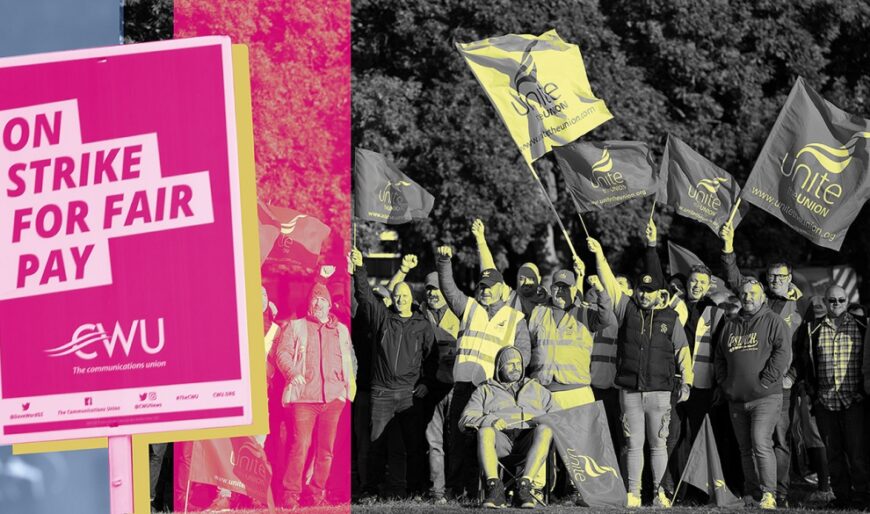Ben Sellers
Ben Sellers, worked for the TUC between 2007 and 2011, first as a graduate of the Organising Academy and then... Read more »
As living standards tumble, we mustn’t be fooled into thinking this is the natural order of things. By getting together we can fight back.

These are extraordinary times. As the Tory government teeters from one crisis to another, and the markets tumble, the trade unions are on the move.
It feels like we are on the brink of a major struggle between the labour movement and those in power, but for many, it is simply a battle for survival.
The last six months have seen an intensification of industrial militancy across a number of sectors, notably on the railways and London Underground, among postal and telecom workers as well as dockers in Liverpool and Felixstowe. Without doubt, the unions are rediscovering their strength.
Nurses in the Royal College of Nursing (RCN) have just voted to strike, in what would be the first nationwide strike in the union’s 106-year history.
We’ve seen overwhelming votes in favour of strike action among university staff in the UCU and PCS members in the Civil Service in the last few weeks, and teachers and NHS staff are likely to join them soon.
This is all in the context of an intense cost-of-living crisis, with gas and electricity bills going through the roof and price inflation making the weekly shop an increasingly daunting experience for those in and out of work.
In the context of CPI inflation which currently stands at 11.1 per cent, offers of 2, 5 or even 8 per cent are nothing but a pay cut, pushing more and more workers into poverty. Prices for food and energy are rising even faster, as we all know.
This, we need to remember, is on the back of a decade or more of austerity, where people’s pay has stagnated, their jobs have been outsourced and casualised and any security that they might have felt has been ripped from them.
What has the government’s response been to this desperate situation? Well, it has spent the last few months inventing various ways to curb the power of the trade union movement, targeting the right to strike in particular.
First, it changed the law over using agency workers to strike-break; second, it massively increased the amount that unions could be fined for supporting unofficial strike action, from £250,000 to £1 million, and then finally, the government has proposed a new Transport Strikes Bill, which will force unions to agree to so-called “minimum service levels,” effectively getting union members to break their own strikes.
But the government hasn’t just been reactive. Clearly preparing for a wave of popular discontent, it has also used its commanding majority in Parliament to force through the Police, Crime, Sentencing and Courts Act and has proposed a Public Order Bill, both of which seriously undermine the right to lawful protest.
The draconian legislation may have been designed with the likes of Extinction Rebellion and Just Stop Oil in mind, but the reality is that the scope is much wider.
For example, the Public Order Bill contains the ability to serve what are called Serious Disruption Prevention Orders on activists, which target people who have been involved in protests over a five-year period (whether they’ve been convicted of an offence or not) and can ban them from attending further protests for up to two years. This is an outrageous attack on civil liberties.
There are also provisions in the Police, Crime, Sentencing and Courts Act which seek to stop “noisy” protest (which can be interpreted by the police as almost anything).
Although not specifically designed to target picketing, it’s clear from the way that the police have handled dissent and protest during the official mourning period for the Queen that we can expect these laws to spread to everything we do in the labour movement.
Where there is solidarity action from campaigning organisations like the People’s Assembly, to support picket lines or industrial action in a very practical way, who is to say that it won’t be interpreted as a noisy, disruptive protest and come under the scope of this legislation?
And so, slowly but surely, the government is making it harder and harder for us to organise against the attacks on our livelihoods and freedoms.
What this all adds up to is a concerted effort by this government to push through lower pay, casualisation, more austerity and service cuts, while blunting any tools we have to resist.
We mustn’t accept this as the natural order. If we work together, we have the most powerful tool of all, which exists in our numbers.
In those numbers, we can be organised and determined, creative and resourceful — in the streets, in our communities and in our workplaces.
The battle, which is already upon us, isn’t just one between employers and workers, or the trade unions and the government. Nothing exists in isolation. It involves all of us and building the links between our struggles is the key to making them feel our strength and organisational power.
On December 3, the Campaign for Trade Union Freedom (supported by the Institute of Employment Rights) has organised a day-long conference, to bring the movement together and focus our opposition to the anti-union laws and restrictions on the right to protest.
Registration and further details can be found here: bit.ly/CfTUFConference.
This article was originally published in the Morning Star. We thank them for their kind permission to reproduce it here
Ben Sellers, worked for the TUC between 2007 and 2011, first as a graduate of the Organising Academy and then... Read more »
Minimum Prospects: the Government’s latest attack on Workers’ Rights